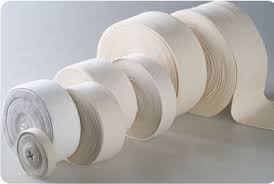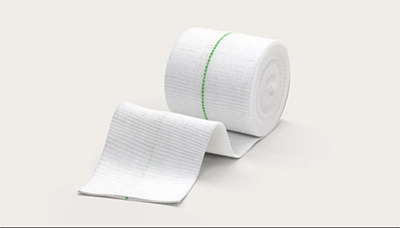Tubular Stretch Bandage: Stockinette VS Middle Line VS Net
Nov 20 , 2024
When comparing Stockinette, Middle Line, and Net types of tubular stretch bandages, it is essential to understand their unique characteristics, applications, and differences. Here's a breakdown:

1. Stockinette
A stockinette tubular bandage is a smooth, continuous fabric designed to fit snugly on the skin.
Key Features:
-
Made of cotton or a cotton-blend material.
-
Provides a soft and comfortable layer, often under a cast or compression wrap.
-
Non-elastic or minimally elastic.
-
Breathable and suitable for sensitive skin.
Applications:
-
Under-cast lining: Protects the skin beneath plaster or synthetic casts.
-
Skin protection: Acts as a base layer under compression bandages.
-
Light coverage: Useful for minor protection without adding compression.
Advantages:
-
Gentle and non-restrictive.
-
Ideal for maintaining hygiene under dressings or devices.
-
Easily cut to size.

2. Middle Line
The "middle line" tubular stretch bandage is an elasticized tubular bandage designed for compression and support.
Key Features:
-
Often marked with a line down the middle for alignment and easy application.
-
Highly elastic, allowing controlled compression.
-
Durable and reusable.
Applications:
-
Compression therapy: Used for swelling, varicose veins, and venous insufficiency.
-
Soft-tissue injuries: Provides support for sprains and strains.
-
Bandage fixation: Keeps wound dressings secure.
Advantages:
-
Provides consistent and even compression.
-
Comfortable to wear for extended periods.
-
Easy to align and apply due to the central guideline.

3. Net
A net tubular stretch bandage is a highly flexible, mesh-like bandage used primarily for holding dressings in place.
Key Features:
-
Constructed from an open-weave, stretchable material (often nylon or polyester blends).
-
Lightweight and breathable.
-
Conforms to irregular body shapes.
Applications:
-
Dressing retention: Keeps gauze or dressings secure without adhesive.
-
Post-surgical wounds: Ideal for covering large or irregularly shaped areas.
-
Head, joints, or extremities: Particularly useful for areas that move frequently or are hard to dress.
Advantages:
-
Quick and easy application.
-
Allows ventilation to the wound or dressing.
-
Suitable for hard-to-bandage areas.
Comparison Table
Type
|
Material
|
Elasticity
|
Best For
|
Key Benefit
|
Stockinette
|
Cotton
|
Low
|
Under casts or as skin protection
|
Gentle and non-compressive
|
Middle Line
|
Elasticized fabric
|
High
|
Compression therapy and support
|
Controlled, even compression
|
Net
|
Open-weave mesh
|
Very High
|
Dressing fixation, irregular shapes
|
Flexible and breathable
|
Summary
-
Stockinette: Best for under-cast use or as a soft base layer.
-
Middle Line: Optimal for compression needs and joint support.
-
Net: Excellent for holding dressings securely on irregular or mobile areas.
Each type serves a specific purpose, and the choice depends on the required application.


